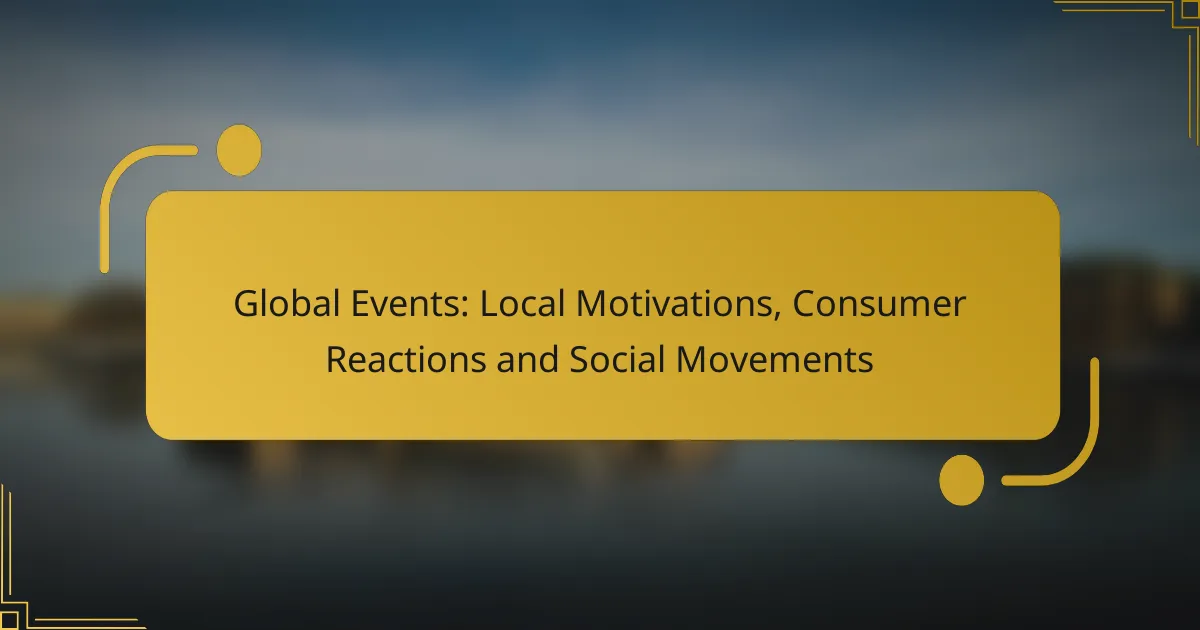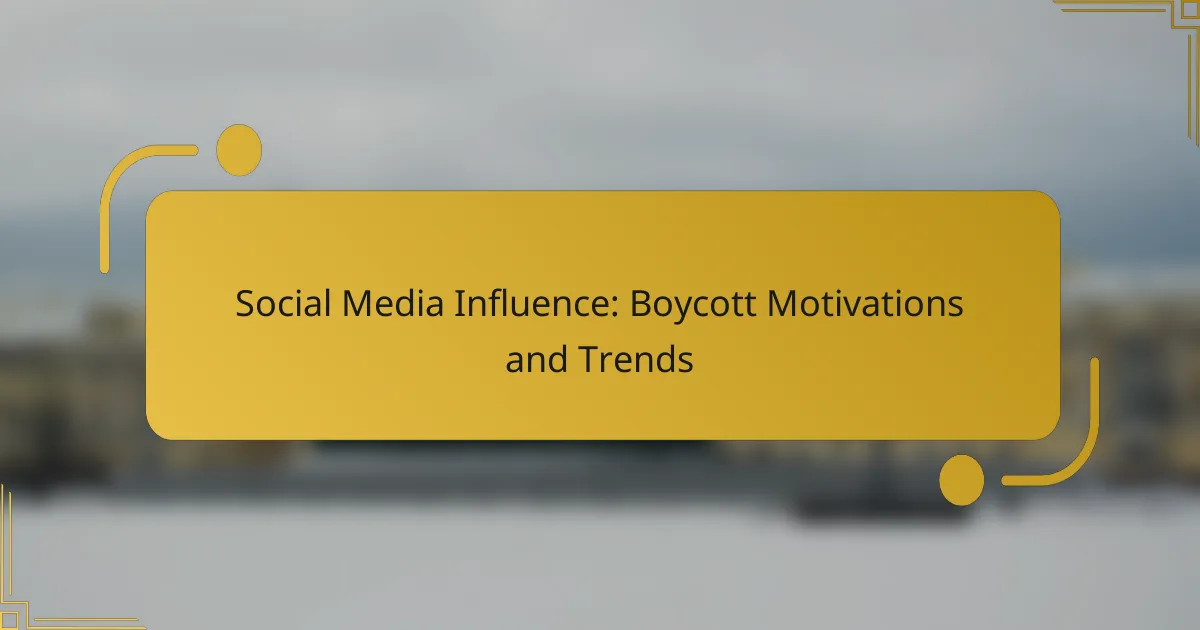Global events play a crucial role in shaping local consumer behavior, prompting shifts in spending patterns and priorities that reflect the themes of these occurrences. Local motivations for engaging with these events often arise from a desire to strengthen community bonds and express shared values, influenced by unique cultural and economic contexts. Additionally, social movements frequently emerge in response to global events, as communities mobilize to address injustices and advocate for change based on both local grievances and wider societal trends.
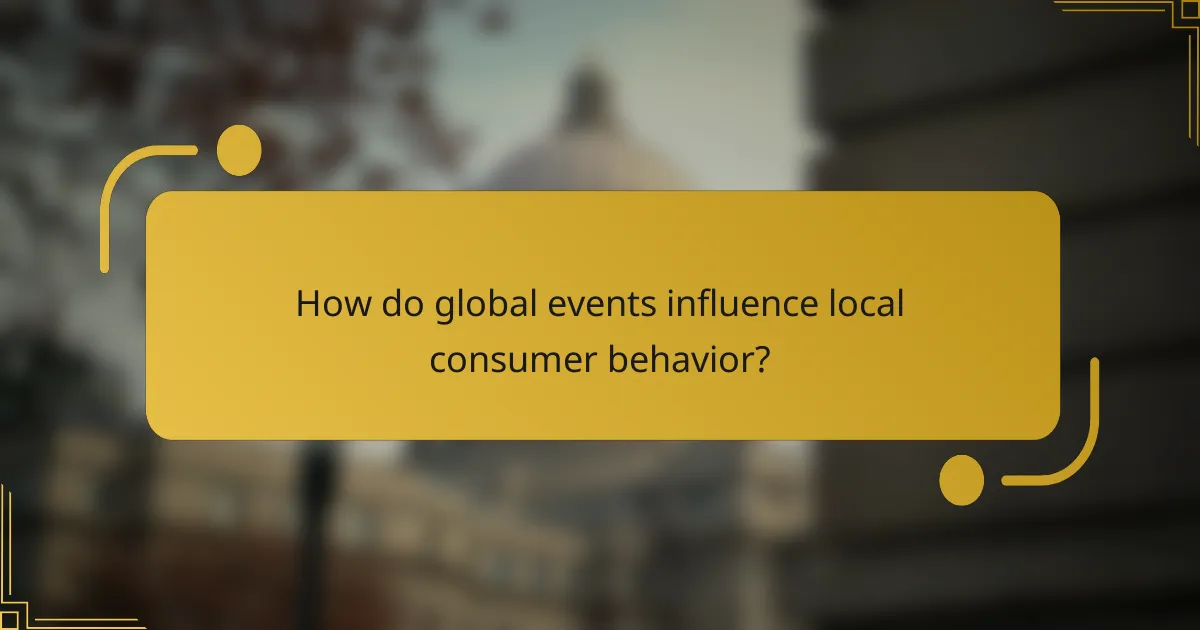
How do global events influence local consumer behavior?
Global events significantly impact local consumer behavior by altering spending patterns and priorities. These influences can lead to increased local spending and shifts in purchasing decisions based on the themes of the events.
Increased local spending during major events
During major global events, such as the Olympics or World Cup, local spending often sees a notable increase. Consumers tend to invest in event-related products and services, including merchandise, food, and entertainment. This surge can boost local economies, particularly in host cities.
For example, restaurants and hotels may experience higher demand, leading to increased prices and promotions aimed at attracting visitors. Local businesses should prepare for these spikes by optimizing inventory and staffing to meet the anticipated consumer influx.
Shift in purchasing priorities based on event themes
Global events can shift consumer purchasing priorities, as people often align their spending with the themes or causes highlighted during these occasions. For instance, during environmental summits, consumers may prioritize eco-friendly products and services, reflecting a growing awareness of sustainability.
Brands can capitalize on this trend by adjusting their marketing strategies to resonate with the event’s themes. Offering promotions on relevant products or supporting associated causes can enhance brand loyalty and attract new customers. Businesses should monitor event-related discussions to align their offerings with consumer sentiment effectively.

What are the local motivations behind participation in global events?
Local motivations for participating in global events often stem from a desire to express community values, foster social connections, and engage in shared experiences. These motivations can vary widely based on cultural, social, and economic factors unique to each locality.
Community identity and pride
Participation in global events can significantly enhance community identity and pride. Local groups often see these events as opportunities to showcase their culture, traditions, and achievements on a larger stage, fostering a sense of belonging among residents.
For example, a city may host an international festival that highlights its unique culinary heritage or artistic talents. This not only attracts visitors but also instills local pride among residents, reinforcing their connection to their community.
Desire for social connection and networking
A strong motivation for attending global events is the desire for social connection and networking. These gatherings provide a platform for individuals to meet others with similar interests, fostering relationships that can lead to personal and professional opportunities.
In many cases, attendees participate in workshops, panels, or informal meet-ups that facilitate networking. This can be particularly beneficial in industries like technology or arts, where collaboration and idea exchange are crucial for growth.
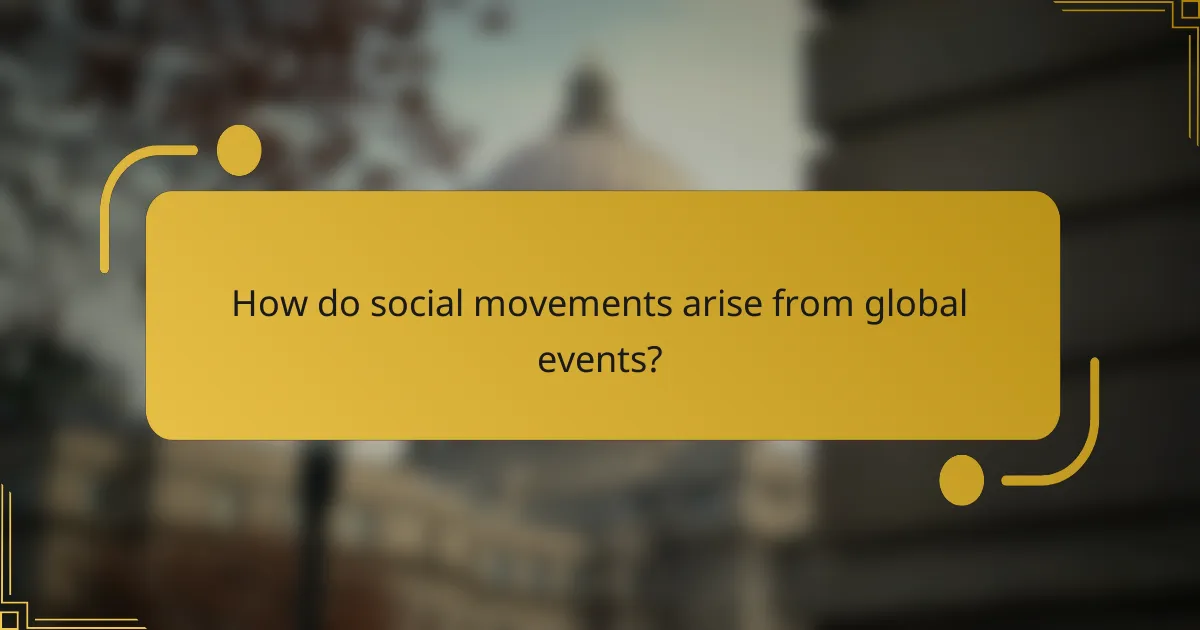
How do social movements arise from global events?
Social movements often emerge in response to global events as communities seek to address perceived injustices or changes affecting their lives. These movements are typically driven by a combination of local grievances and the influence of broader societal trends, leading to organized efforts for change.
Mobilization of grassroots organizations
Grassroots organizations play a crucial role in mobilizing communities around social movements. They often leverage local networks to raise awareness, gather support, and coordinate actions that reflect the community’s needs and aspirations. For example, a global climate summit may inspire local environmental groups to organize protests or educational campaigns in their regions.
Effective mobilization requires clear communication and strategic planning. Organizations should focus on building relationships within the community and utilizing social media platforms to amplify their message. Common pitfalls include failing to engage diverse voices or relying too heavily on top-down approaches, which can alienate potential supporters.
Increased visibility of social issues
Global events can significantly raise the visibility of social issues, prompting widespread public discourse and engagement. Media coverage of international crises, such as humanitarian disasters or political unrest, often highlights related local issues, encouraging communities to take action. For instance, the global response to racial injustices can lead to local movements advocating for equality and reform.
To capitalize on this increased visibility, local activists should connect their causes to global narratives, making their issues relatable and urgent. This can be achieved through storytelling, public demonstrations, and partnerships with larger organizations. However, it is essential to ensure that local voices are prioritized and not overshadowed by broader narratives.
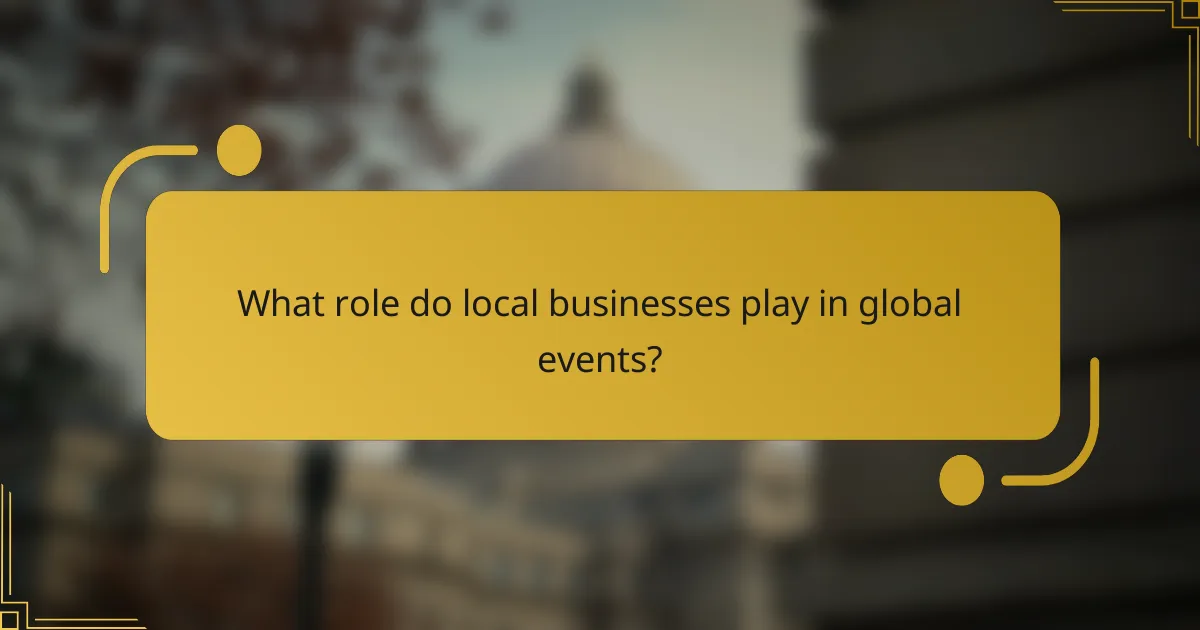
What role do local businesses play in global events?
Local businesses significantly influence global events by adapting their offerings to meet the needs of the community and the event’s audience. They leverage their unique position to enhance the event experience while driving local economic growth.
Promotion of event-related products and services
Local businesses often create and promote products or services specifically tailored for global events. This can include themed merchandise, food and beverage specials, or unique experiences that resonate with attendees. For example, a local café might offer a special menu item inspired by an international festival.
Effective promotion can be achieved through social media campaigns, collaborations with influencers, or partnerships with event organizers. Businesses should consider using targeted advertising to reach potential customers who are attending the event.
Collaboration with event organizers for sponsorship
Collaboration with event organizers allows local businesses to gain visibility and credibility. By sponsoring events, they can showcase their brand to a larger audience and create a positive association with the event’s theme. This partnership can take various forms, such as financial sponsorship, providing goods or services, or hosting activities at the event.
Businesses should evaluate the potential return on investment when considering sponsorship opportunities. Engaging with event organizers early in the planning process can lead to more effective collaborations and ensure that the business’s contributions align with the event’s goals.
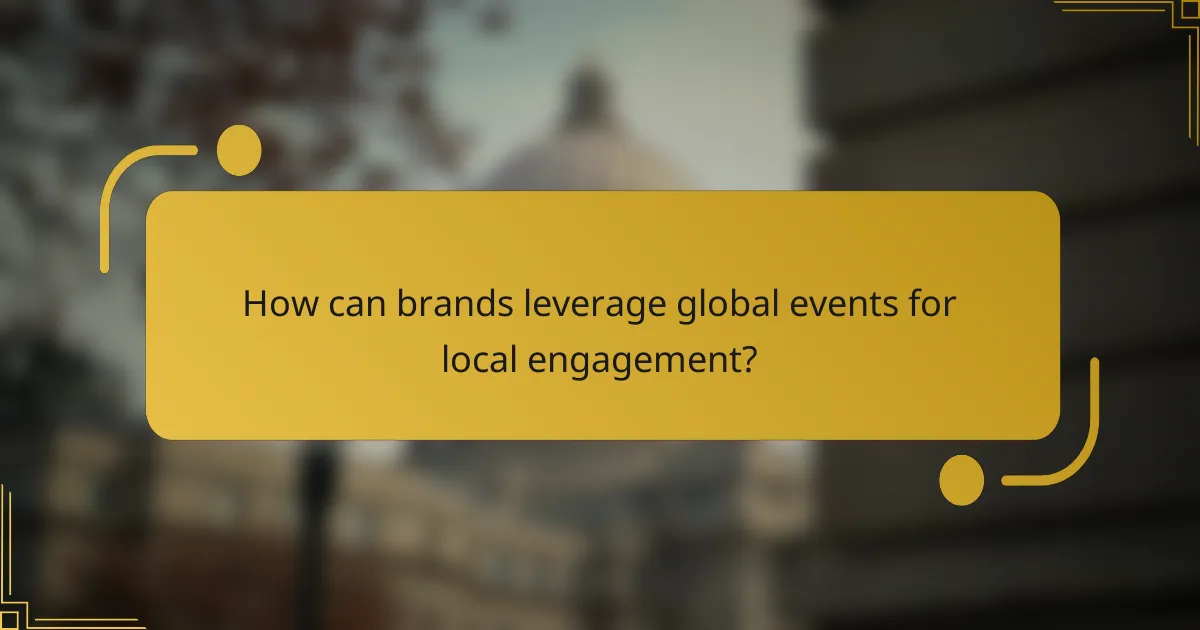
How can brands leverage global events for local engagement?
Brands can effectively leverage global events by tailoring their marketing strategies to resonate with local audiences. This involves understanding the cultural significance of the event and creating campaigns that reflect local values and preferences.
Targeted marketing campaigns during events
Targeted marketing campaigns during global events can significantly boost local engagement. Brands should analyze the event’s themes and local sentiments to craft messages that resonate with their audience. For example, during major sports events, brands can create promotions that tie into local teams or athletes, enhancing relatability.
Utilizing social media platforms for real-time engagement is crucial. Brands can run contests, share user-generated content, or offer exclusive deals that align with the event, encouraging participation and interaction. This approach not only increases visibility but also fosters a sense of community among consumers.
Community involvement initiatives
Community involvement initiatives allow brands to connect with local consumers on a deeper level during global events. By sponsoring local events or collaborating with community organizations, brands can demonstrate their commitment to the area. For instance, a brand might support a charity run during a global sports event, linking their identity to local causes.
Engaging in volunteer activities or organizing community events can also enhance brand reputation. Brands should focus on initiatives that reflect their values and resonate with local consumers. This not only builds goodwill but also strengthens customer loyalty, as consumers appreciate brands that contribute positively to their communities.
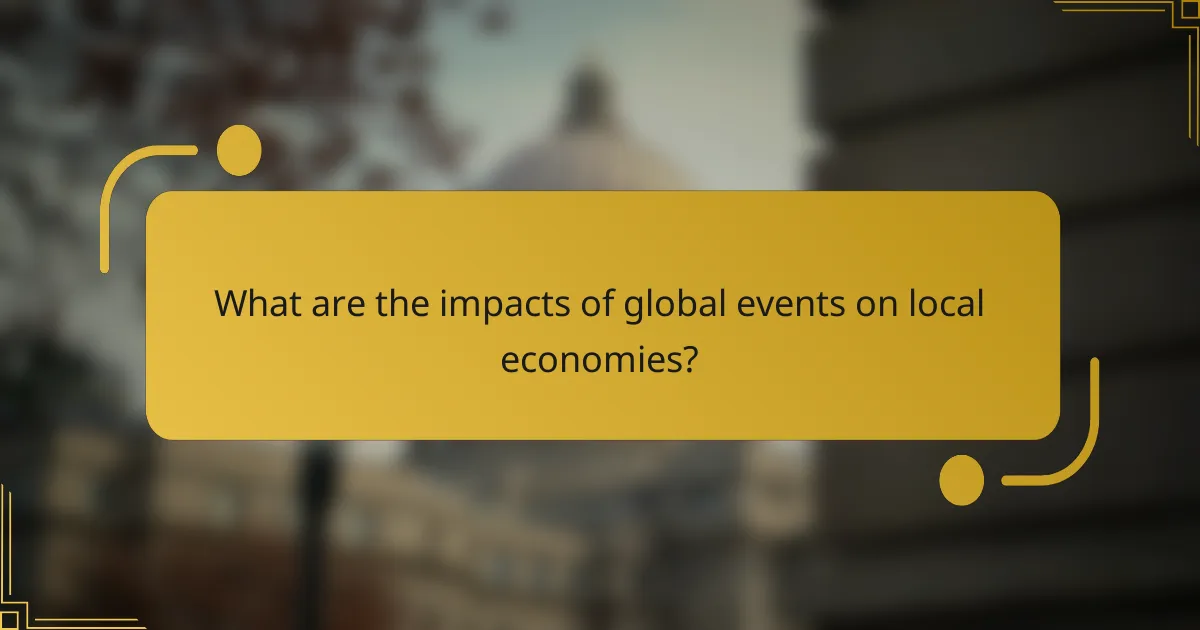
What are the impacts of global events on local economies?
Global events can significantly influence local economies by altering consumer behavior, attracting investments, and shifting employment patterns. These impacts often manifest in various sectors, particularly tourism and job creation in industries related to the events.
Boost in tourism and hospitality sectors
Global events, such as international sports competitions or cultural festivals, often lead to a surge in tourism. Local hotels, restaurants, and attractions typically experience increased demand, resulting in higher revenues and potential expansion opportunities.
For instance, a major sporting event can draw thousands of visitors, leading to a noticeable uptick in hotel bookings and dining reservations. Cities hosting such events may see tourism revenues rise by significant percentages, benefiting local businesses and the overall economy.
Job creation in event-related industries
Local economies often see job creation in industries directly related to global events. This includes temporary positions in event management, security, hospitality, and transportation services. Such jobs can provide valuable experience and income for many residents.
Moreover, the influx of visitors can prompt long-term employment opportunities as businesses expand to accommodate increased demand. For example, a city that hosts an international conference may invest in infrastructure improvements, leading to sustained job growth in construction and service sectors.
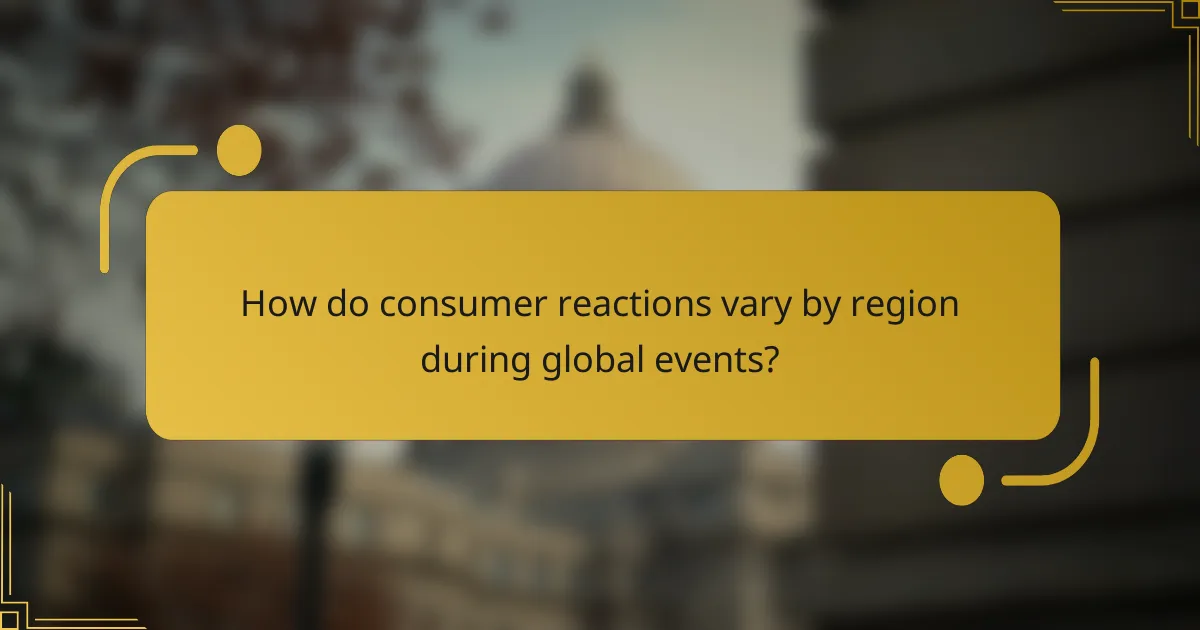
How do consumer reactions vary by region during global events?
Consumer reactions during global events differ significantly by region due to cultural, economic, and social factors. These variations influence how communities engage with events, shaping their participation and sentiment towards brands and products.
Regional differences in event participation
Participation in global events can vary widely based on regional interests and cultural significance. For instance, in North America, events like Black Friday see high consumer turnout, while in Europe, similar shopping days may not attract the same level of engagement. Local traditions and holidays also play a crucial role in determining participation rates.
In Asia, festivals such as Diwali or Lunar New Year can lead to increased consumer activity, with many businesses tailoring their marketing strategies to align with these celebrations. Understanding these regional differences is essential for brands aiming to connect with local consumers effectively.
Variations in consumer sentiment and engagement
Consumer sentiment during global events can shift dramatically based on regional contexts. In regions experiencing economic hardship, such as parts of Eastern Europe, consumers may exhibit more cautious spending behavior, prioritizing essential goods over luxury items. Conversely, in wealthier areas, such as Western Europe or North America, there may be a tendency to indulge in discretionary spending during major sales events.
Engagement levels also fluctuate; for example, social media campaigns may resonate more in regions with high digital penetration, like Scandinavia, while traditional marketing methods might be more effective in areas with lower internet access. Brands must tailor their approaches to match the sentiment and engagement styles prevalent in each region to maximize impact.

What are the emerging trends in consumer behavior during global events?
Emerging trends in consumer behavior during global events include a heightened awareness of sustainability and a significant increase in digital engagement. Consumers are increasingly motivated by ethical considerations and are adapting to new ways of participating in social movements and events through online platforms.
Increased focus on sustainability
During global events, consumers are prioritizing sustainability more than ever. This shift is driven by a growing awareness of environmental issues and the impact of consumer choices on the planet. Brands that demonstrate a commitment to sustainable practices often see increased loyalty and sales.
For instance, companies that use eco-friendly materials or implement sustainable supply chains can attract consumers who are willing to pay a premium for green products. It’s essential for businesses to communicate their sustainability efforts clearly to resonate with this conscientious audience.
Rise of digital engagement and virtual participation
Digital engagement has surged during global events, allowing consumers to participate in movements and discussions from anywhere. Social media platforms and virtual events have become vital channels for activism and consumer interaction, enabling real-time communication and mobilization.
Businesses should leverage these digital tools to connect with their audience effectively. For example, hosting live-streamed events or interactive webinars can enhance consumer involvement and foster a sense of community. However, companies must ensure that their online presence is authentic and aligns with their values to build trust with consumers.
